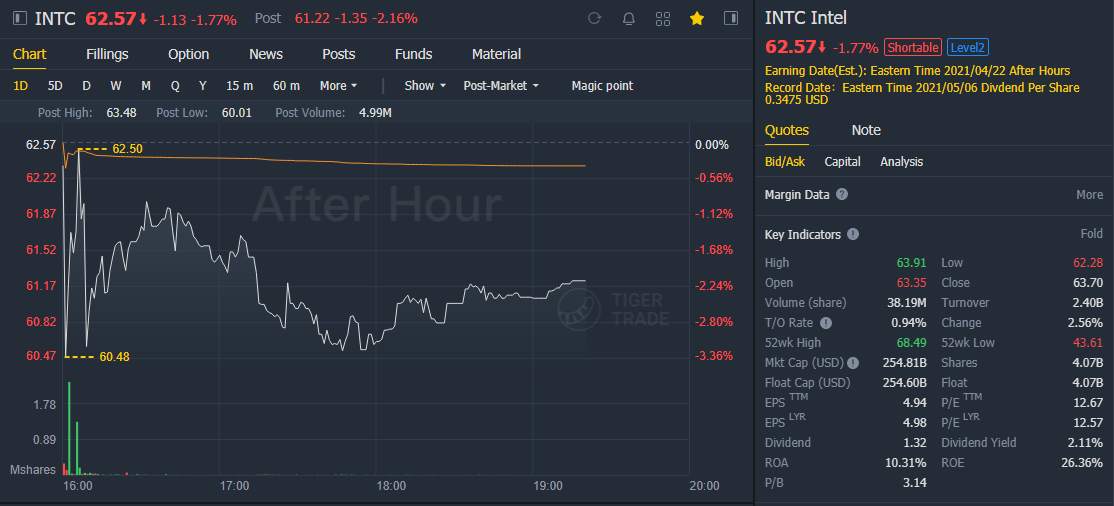CEO Gelsinger says Intel will 'fight for every socket' in the competitive data-center market.
Intel Corp. shares fell in the extended session Thursday despite a big earnings beat and a raised annual forecast, as a large dip in data-center sales was papered over by strength in sales of personal computers and a departing memory business.
Intel $(INTC)$ shares fell about 2.2% in after-hours trading, following a 1.8% decline in the regular session to close at $62.57.
Intel's data-center group saw revenue fall more than 20% to $5.56 billion, while analysts surveyed by FactSet expected $5.89 billion. Intel is facing increased competition from rival Advanced Micro Devices Inc. $(AMD)$ and GPU specialist Nvidia Corp. $(NVDA)$ in the data-center category.
On a call with analysts, Intel Chief Executive Pat Gelsinger, in his first earnings report since officially taking over, noted that Intel had just recently launched its new generation of Xeon server chips, codenamed "Ice Lake," and that the industry is just beginning to emerge from a digestion phase from data centers and that Intel is "starting to see signs that they want to start the next build phase in their cloud."
"We are already shipping Ice Lake to more than 30 customers including major cloud providers communication service providers, enterprise, and [high performance computing] customers," Gelsinger said, adding that Intel was going to be very aggressive in marketing to data centers.
"We're going to fight for every socket in the market," Gelsinger said.
On the PC side, Gelsinger said PC demand leapt to levels not seen since 2012 because of COVID-19.
"And that's continuing," Gelsinger said. "2021 is shaping up to be the largest PC market ever. In fact, we shipped more notebook CPUs in Q1 than in any other quarter in our history." The CEO said that "one PC in every home is no longer enough."
Intel's largest segment -- client-computing, the traditional PC group -- grew more than 8% to $10.6 billion, with analysts expecting $10.17 billion.
As incoming CEO, Gelsinger dropped into Intel's last earnings conference call after taking the helm.
Intel reported first-quarter net income of $3.4 billion, or 82 cents a share, compared with $5.66 billion, or $1.31 a share, in the year-ago period. After adjusting for more than $2.2 billion for restructuring and other efforts, as well as other adjustments, Intel reported earnings of $1.39 a share, compared with $1.45 a share from a year ago.
Revenue declined to $19.7 billion from $19.83 billion in the year-ago quarter, for a third straight quarter of year-over-year revenue declines, but came in much higher than expected. Analysts had estimated adjusted earnings of $1.15 a share on revenue of $17.79 billion, while Intel had forecast adjusted earnings of $1.10 a share on revenue of about $17.5 billion. Intel also noted that revenue after removing results from the memory business it is in process of selling was $18.6 billion, still well higher than analysts' estimates.
Intel predicted Thursday annual revenue of approximately $77 billion, or $72.5 billion without the memory business, and adjusted earnings of $4.60 a share. Gelsinger had previously targeted $4.55 a share on sales of $76.5 billion.
For the second quarter, Intel forecast revenue of $18.9 billion, or $17.8 billion when removing the memory business, and GAAP and non-GAAP earnings of $1.05 a share. Analysts on average expected adjusted second-quarter earnings of $1.09 a share on revenue of $17.55 billion.
"Overall, Intel had a good quarter as it is taking advantage of the huge uptick in overall compute demand for computers," said Patrick Moorhead, principal analyst at Moor Insights & Strategy, in emailed comments. "The data-center numbers were planned to be down at these levels, but I think some industry analysts may be making some misallocations in their calculations."
Intel reported that nonvolatile memory-solutions revenue declined slightly to $1.11 billion, far surpassing Wall Street's expectations of $563.8 million. "Internet of Things," or IoT, revenue rose to $914 million, compared with an expected $774.9 million. Mobileye revenue was $377 million, while the Street had expected $332.3 million.
Over the past 12 months, Intel shares have gained 4%, while the Dow Jones Industrial Average -- which counts Intel as a component -- has gained 44%, the S&P 500 index has grown 48%, the tech-heavy Nasdaq Composite Index has surged 63%, and the PHLX Semiconductor Index has ballooned 86%.

Comments